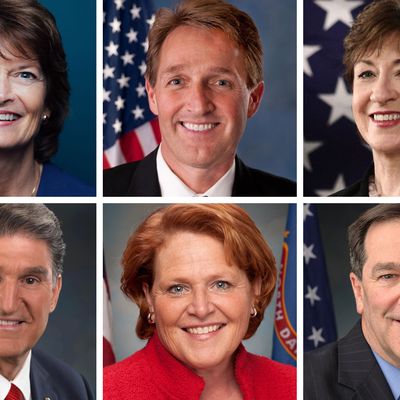
Anthony Kennedy was the one Republican-appointed justice who unambiguously opposed overturning Roe v. Wade. At least three of the high court’s conservative jurists are eager to issue such a ruling. And although some court-watchers suspect John Roberts might be too averse to upsetting precedent (and the public) to join them, the chief justice has given multiple indications that this suspicion is mistaken.
Further, there is little doubt that Donald Trump will at least try to replace Kennedy with a justice who is prepared to clear the way for the prohibition of abortion. No constituency is more responsible for the president’s election than white Evangelical Christians, who backed Trump over Clinton by a margin of 81 to 16 percent. Since taking office, Trump has given archconservatives free reign over his judicial appointments. And they already have a list of reliably anti-Roe Supreme Court nominees ready and waiting for his perusal.
The question, then, is whether 50 senators will be willing to confirm such a nominee. There are 49 Democrats (two are technically “independents”) and two pro-choice Republicans. Together, they could conceivably veto any nominee that smells like a threat to reproductive freedom. But there’s reason to doubt that they will. Here are three questions that will decide whether Trump’s next Supreme Court pick gets seated:
Will “Trump country” Democrats toe the party line?
Three Democrats voted to confirm Neil Gorsuch to the seat Mitch McConnell stole from Barack Obama: Joe Manchin, Joe Donnelly, and Heidi Heitkamp.
All three will need to fend off formidable Republican challengers in deep-red states this fall. To do that, they’re going to have to mobilize the Democratic base, while projecting a bipartisan — if not outright pro-Trump — image to the broader electorate. This was a difficult task yesterday; it’s a borderline impossible one now.
The case for thinking that all three will vote against a far-right Supreme Court pick goes like this: Voting to replace Antonin Scalia with Gorsuch did not upset the court’s longtime balance of forces; Scalia was an archconservative enemy of abortion rights and gay marriage, Gorsuch was (presumably) the same. By contrast, replacing Kennedy with a Gorsuch clone could transform American jurisprudence on matters near and dear to Democratic voters.
Alas, the case for assuming that at least one of these Democrats will break ranks again is stronger. Not only is it in all of their immediate political interests to avoid crossing Trump’s base, they can do so while framing their acquiescence as a defense of high principle: As Democrats argued in 2016, the Senate has an obligation to confirm any conventionally qualified jurist the president puts forward; it isn’t the Senate’s role to dictate Supreme Court decisions, only to verify a given nominee’s credentials for holding such a post.
Plus, Joe Donnelly is pro-life; as is Joe Manchin — at least, whenever claiming that identity is politically convenient.
Do Lisa Murkowski and Susan Collins feel like exercising power on their constituents’ behalf?
In stark contrast to the Democratic swing votes, Collins and Murkowski are insulated from near-term electoral considerations — and likely, even from long-term ones. Both senators have strong personal brands in their states, and do not need much support from their party to win reelection. If they did, they (probably) wouldn’t both officially support abortion rights. And during the fight over Obamacare repeal, Collins and Murkowski proved themselves willing to defy the GOP Establishment on a matter of enormous stakes.
But then, both have largely been rubber stamps on Trump’s cabinet and judicial appointees. And Collins’s early signals suggest that she might rather preserve procedural norms and party loyalty, than a woman’s right to choose.
Just how much does Jeff Flake hate tariffs?
Until this week, Jeff Flake was best known as the anti-Trump Republican senator who would take on the GOP president with tweets and essays — but never with the immense powers of his office.
And yet, while Flake didn’t feel compelled to use his formal authorities to sanction praise for white nationalists, the systematic abuse of immigrant children, or the president’s constant attacks on the free press and federal law enforcement, Trump’s decision to raise taxes on steel imports was a bridge too far.
“I think myself and a number of senators, at least a few of us, will stand up and say, ‘Let’s not move any more judges until we get a vote, for example, on tariffs,’” Flake told ABC’s This Week on Sunday.
Mitch McConnell, for his part, has shown no interest in holding such a vote. And Trump has shown even less interest in calling off his many trade wars. So, at least in the short-term, Flake could conceivably compensate for one defection among the aforementioned Democratic and pro-choice Republican senators — depending on just how passionately the Arizona lawmaker hates tariffs.
All of which is to say: It’s possible that the Senate could prevent Trump from appointing an anti-Roe reactionary to the Supreme Court — but I wouldn’t bet your life (or reproductive liberty) on it.






























